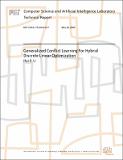Generalized Conflict Learning For Hybrid Discrete Linear Optimization
Author(s)
Li, Hui X.
DownloadMIT-CSAIL-TR-2010-017.pdf (1.009Mb)
Other Contributors
Model-based Embedded and Robotic Systems
Advisor
Brian Williams
Metadata
Show full item recordAbstract
Conflict-directed search algorithms have formed the core of practical, model-based reasoning systems for the last three decades. In many of these applications there is a series of discrete constraint optimization problems and a conflict-directed search algorithm, which uses conflicts in the forward search step to focus search away from known infeasibilities and towards the optimal solution. In the arena of model-based autonomy, discrete systems, like deep space probes, have given way to more agile systems, such as coordinated vehicle control, which must robustly control their continuous dynamics. Controlling these systems requires optimizing over continuous, as well as discrete variables, using linear and non-linear as well as logical constraints. This thesis explores the development of algorithms for solving ybrid discrete/linear optimization problems that use conflicts in the forward search direction, generalizing from the conflict-directed search algorithms of based reasoning. We introduce a novel algorithm called Generalized Conflict-directed Branch and Bound (GCD-BB). GCD-BB extends traditional Branch and Bound (B&B), by first constructing conflicts from nodes of the search tree that are found to be infeasible or sub-optimal, and then by using these conflicts to guide the forward search away from known infeasible and sub-optimal states. We evaluate GCD-BB empirically on a range of test problems of coordinated air vehicle control. GCD-BB demonstrates a substantial improvement in performance compared to a traditional B&B algorithm, applied to either disjunctive linear programs or an equivalent binary integer program encoding.
Description
SM thesis
Date issued
2005-05-20Citation
Li, H., Generalized Conflict Learning For Hybrid Discrete Linear Optimization, Master's Thesis, MIT, 2005
Series/Report no.
MIT-CSAIL-TR-2010-017
Keywords
Constraint satisfaction, Optimization, Hybrid systems